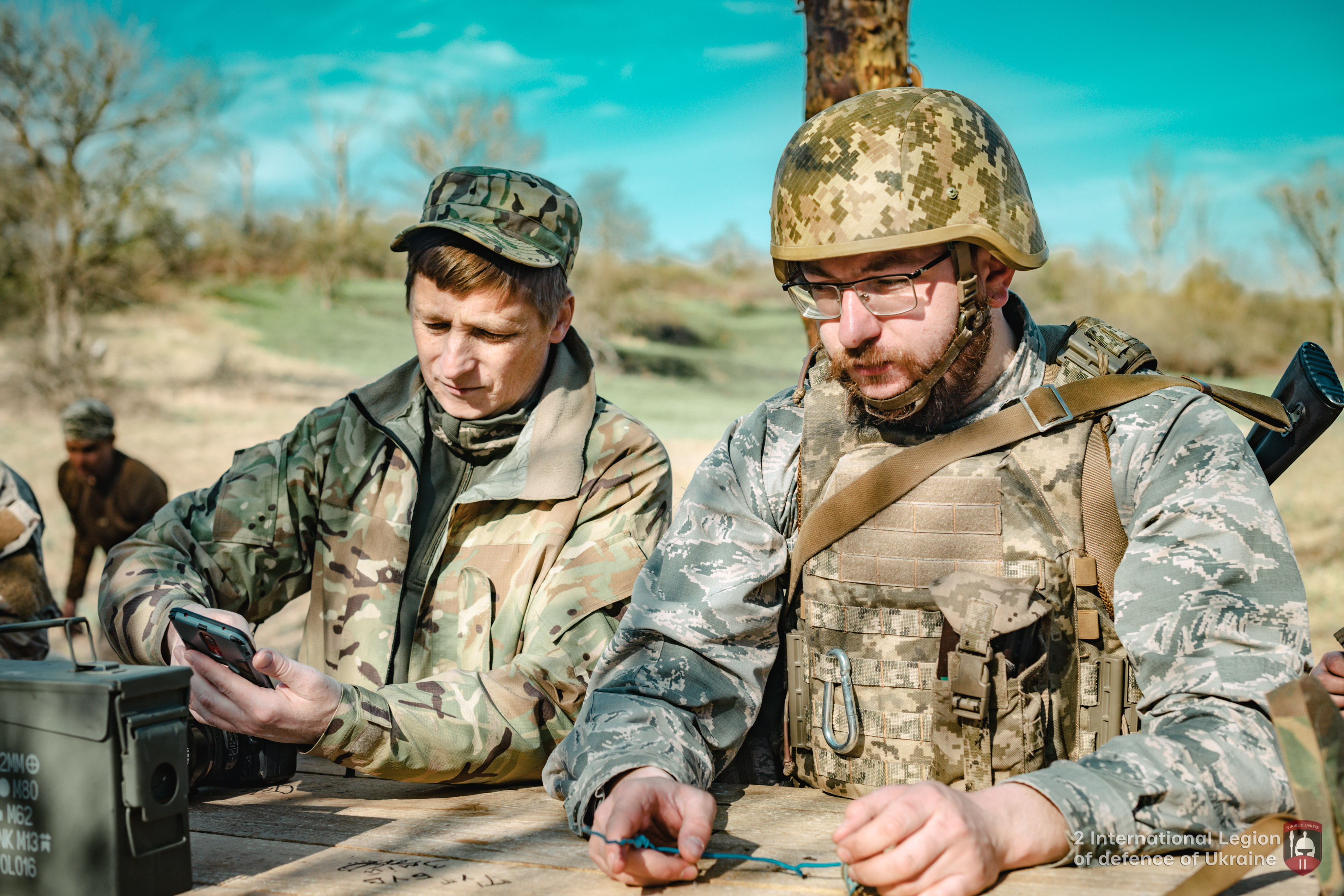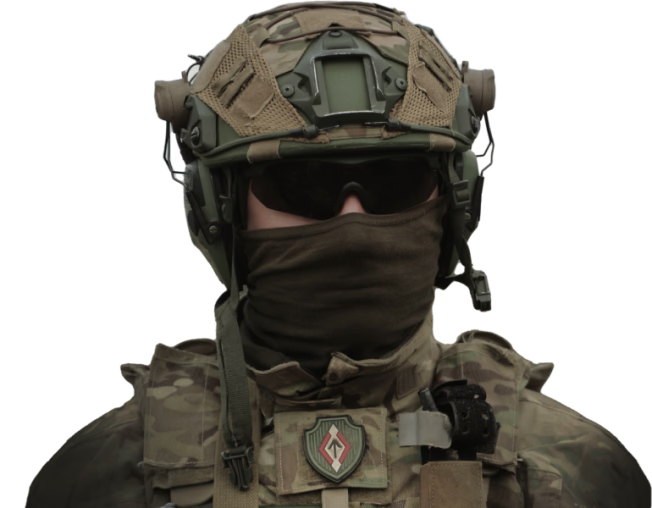
How foreigners are fighting for Ukraine
Irish recklessness, Colombian neatness, British organization and Japanese self-discipline: war and life of the International Defense Legion of Ukraine
Rostyslav Fedorko is an extraordinary personality. His interests range from the exact sciences, technical knowledge and foreign languages to academic vocals and anime culture. The man fought for the Ukrainian cause as a civic activist, managed to distinguish himself on the cultural front, and did not shy away from volunteer work and the path of the volunteer. All of this, traditionally, at a high level, with quite significant results. But Rostyslav decided that he was not doing enough for the Ukrainian cause, so he joined the Armed Forces and has been fighting in the ranks of the International Defense Legion of Ukraine for two years. We offer the reader the legionnaire's vivid observations about individuals who came from different parts of the world to support Ukrainians in the fight against Russian invaders with their weapons and courage.
In 2013, Rostyslav came to the capital to study at the Igor Sikorsky Kyiv Polytechnic Institute. Later he became an active participant in the Revolution of Dignity, and since then, civic engagement has been a key part of his life as a patriot:
“Back then, I fought for Ukraine in non-military ways. It was cultural and social activism. We popularized Ukrainian as much as we could. Basically, the war became a logical continuation of my life”, the legionnaire concludes.
“During the Anti-Terrorist Operation, Rostyslav was engaged in volunteer activities - he helped the St. Mary's battalion. He was actively interested in translation. He learned English so well on his own that he worked as a translator of specialized technical texts before officially signing a contract with the Armed Forces of Ukraine in 2023”.
Rostyslav participated in the life of his church community and was the vocalist of the community's musical group. Even during his military service, he still found the opportunity to practice academic vocals remotely for some time.
“Back in 2014, my friends introduced me to Japanese culture. And I organized a meeting and activities of the Mitsuruki anime club. At first, it was a Kyiv club, then an all-Ukrainian one. The club's activities were aimed at Ukrainizing anime culture, because earlier, like in many other places, anime in Ukraine was watched in Russian. And we had to prove, argue, and show people that there was anime in Ukrainian. And we worked in this direction”, Rostyslav shares his memories.
The outbreak of large-scale Russian aggression put the volunteer in front of a logical choice. He was well aware of the weight and consequences of potential decisions:
“For some 20 seconds I was very scared. I just realized that if I went further, let's say, down the road of war, participation in this war, I could face death, injury. I asked God for courage, prayed in my mind, and the fear disappeared. And we immediately began to act: we gathered with friends at first in our apartment, and from there we went to organize resistance. We accepted the first people, received the first weapons, and formed units in coordination with representatives of the Armed Forces of Ukraine”, the junior sergeant says about the moment of truth and the key choice in his life.
During the defense of the Kyiv region, his dedication, efficiency and responsibility simply did not allow him to break away from fulfilling his obligations:
“I had to give each machine gun to someone, write down who these people were, organize the work somehow, and for the first week I did not physically leave this basement at all and, in fact, spent most of my time in such bureaucratic activity. All my friends in Kyiv told me stories of how a missile had hit their house in front of them, how planes were being shot down. I didn't see any of this, I only heard the explosions. And somehow I feel the difference between my experience and the experience of others during this period”, Rostyslav recalls. This state of affairs did not suit the patriot, so at the first opportunity he decided to change his rear position.
Many foreigners enlisted in the volunteer unit where he served. Rostyslav, who spoke English well, was assigned the task of communicating with them. One of these foreigners actually informed him about the positions in the International Legion of Defense of Ukraine, where he had transferred a little earlier.
“At the time, I was formally working as a translator and felt a little “out of place” in civilian life. Despite the fact that I did not storm the landings, I was not a Rex, I was already looking for options to get back to participating in this war. I called a recruiter and 3 days later I was already at the permanent location of the military unit, it was on August 17, 2023”, the legionnaire says.
Most of all, Rostyslav Fedorko, who was already quite familiar with military specifics at that time, was impressed by the people:
“An Irishman, half of Brazilian descent, served with us. A man who felt equally at ease with both his English-speaking colleagues and Latin Americans. He combines all of these traits and is an incredible daredevil who is fun to be around under any circumstances. He performed difficult missions, came out of many battles safely and is now at home”, says the junior sergeant about his comrade.
“In general, the relations in the unit are ethical. A stable system of common rules has been formed between people of completely different cultures, where everyone respects the personal boundaries of others. There are no unresolvable conflicts, everyone tolerates each other, realizing that this is necessary for understanding, efficiency and achieving a common goal. In such an atmosphere, the features and differences of individual cultures are not erased. Common traditions are simply formed that do not affect your identity and, accordingly, everyone can work in one team.
War is a special extreme situation, and people's characters are also manifested in a special way:
“The most responsible are usually those from whom you do not expect it. In particular, when a difficult situation came, especially active enemy assaults, heavy shelling, there were people who may not have been the most obedient and disciplined in army everyday life, who behaved desperately, and even a little crazy, it seems. But they are the ones who stayed in the most difficult moments, stood up for all those hard days, and then became the people we know them as usual”, Rostyslav says.
Representatives of about 30 countries serve in the junior sergeant's unit. The defender shares interesting observations about their characteristics and preferences:
“The Japanese, in general, have justified the stereotype I had about them. They are organized, self-disciplined people who are not too lazy to do exercises in the morning, train to keep fit on their own and without orders, are interested in everything they do, try to understand, study and understand the essence of it. They are very polite. At the same time, they are accurate shooters.
The British and New Zealanders are proactive, reckless, and generally good soldiers. They know how to organize among themselves. You will not meet a Briton by himself. They form a small group and act in it, always knowing how to be in solidarity with each other.
Colombians are characterized by a bright sense of humor, spontaneity, and their homes are always very well decorated. Sometimes you see an old abandoned front-line house where the owner died ten years ago, where everything is just dirty. As soon as the Colombians enter, despite the shelling and fighting, they wash everything, carefully arrange the remains of furniture, and try to organize some kind of life. Even under such conditions, the Colombians who fight in our unit are very tidy in their daily lives.
Like many soldiers, Rostyslav, despite numerous successfully completed missions, is reluctant to recall combat situations, modestly saying that he does not consider them to be anything out of the ordinary. Instead, he is happy to talk about the bright personalities of his fellow soldiers.
“We had a lieutenant in the Brazilian army who we called ‘Aquaman’ because he literally looked like Jason Momoa. He was very charismatic and called us legionaries in the same way as the ancient Roman legionaries. Before each rotation, he would do a line-up, encouraging others with simple chants. “Charlie”, “Sparta”, “legion Family”. He always improvised what to shout, and everyone, thanks to his respect and charisma, was very supportive. When he was a commander, he always went out on his own. Even when he was wounded. He returned after receiving medical treatment and still went to the positions with his wounded shoulder. There was a case when Aquaman “took down” a drone from 200 meters with his favorite FN FAL rifle, which is also used in the Brazilian army! It's very difficult.
The time of the short interview passed quickly, leaving us with a lot of impressions and deep thoughts. The calmness, self-control and balance of the interlocutor in every word would have given us the impression that we were talking to a university professor, not an experienced warrior who had just recently arrived from the area of active operations and would return there very soon. After all, Rostyslav's comrades-in-arms, a family formed by the best personalities from almost all over the world, the International Legion of Defense of Ukraine, are performing combat missions there, on the contact line, deterring the most dangerous threat to modern humanity.
Volodymyr Patola
Photo by Oleksandr Zakletskyi
For reference:
The International Legion of Defense of Ukraine operates in the form of military units within the Land Forces of the Armed Forces of Ukraine.
The personnel of the International Legion of Defense of Ukraine are members of the Armed Forces of Ukraine, perform the same duties and enjoy the same rights, including financial and social security, as other members of the Armed Forces of Ukraine.
Citizens of other countries serve in the International Defense Legion of Ukraine alongside Ukrainians.
In this case, foreigners can conclude the first contract for military service in the International Defense Legion of Ukraine for a period of 6 months.
You can contact representatives of the International Defense Legion of Ukraine on issues related to military service by following the link: https://ildu.legion.army/
The official mailbox where candidates for service in the International Defense Legion of Ukraine can send their applications is [email protected]



